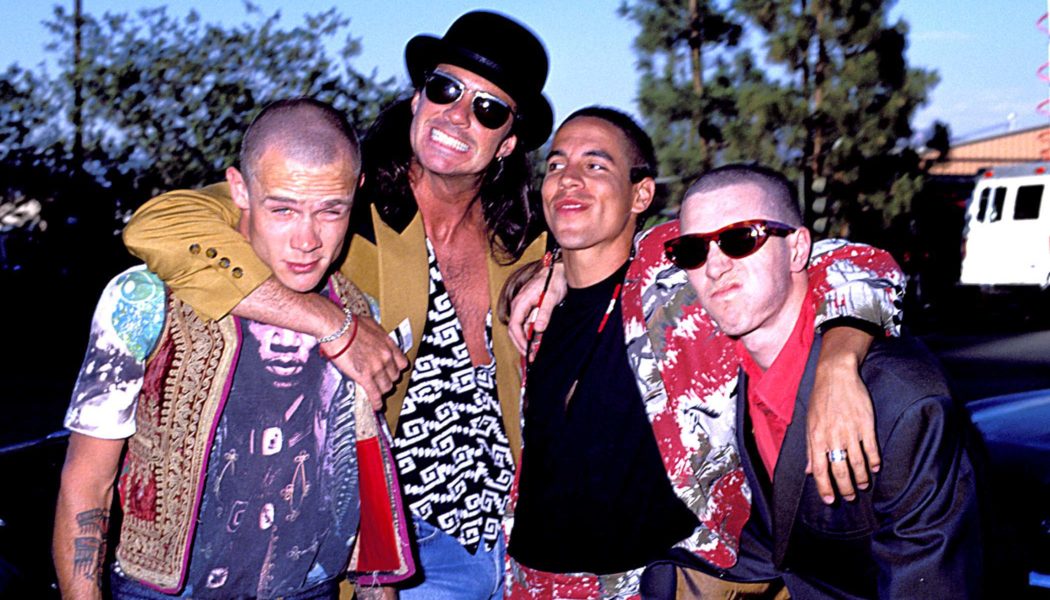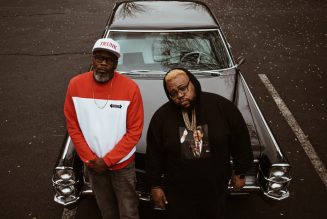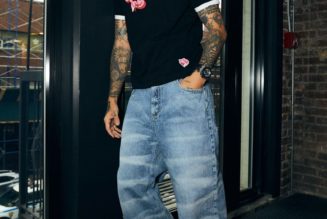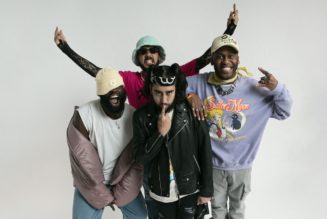“There’s the thing with the Chili Peppers: We put socks on our dicks, and we’re never going to outrun it,” Flea told GQ in 2019. “People are always going to think of that. I feel that ultimately the measure of art that we or I created, as good as it is, over time will stand for what it is. The core essence of it, the cerebral part of it — the emotional, spiritual, and physical — are things that will always survive.”
With the Red Hot Chili Peppers, there’s always been that delicate balance of junk-swinging funk-rock jock and peace-promoting psychedelic muso. And no album better represents that symbiosis than the group’s 1991 blockbuster, Blood Sugar Sex Magik. While it may be forever remembered for a handful of massive singles (the pulverizing “Give It Away,” the pensive “Under the Bridge”), there are a lot of strange, oft-forgotten sounds rumbling under its hood.
Blood Sugar emerged during a pivotal time for rock music: It was originally released on Sept. 24, 1991 — the same day Nirvana released the culture-shifting Nevermind, and only a few weeks after Pearl Jam’s Ten and Metallica’s “Black Album.” All of those records still maintain their own unique character — a window into the eclecticism of the alternative boom. And the Chili Peppers were essential to cementing that freedom.
To mark the record’s 30th anniversary, we spoke to a handful of artists — including Delicate Steve, Eric Slick and RHCP touring member Nate Walcott — about their favorite Blood Sugar moments, the project’s distinctive sound and how these songs still crystalize a moment in time.
Nate Walcott (RHCP touring member, Bright Eyes)
I grew up in upstate New York, but my parents moved to Nebraska when I was eight, and that’s how I met my Bright Eyes associates Conor [Oberst] and Mike [Mogis]. I was a very shy, nerdy eighth grader when this record came out. I was deep, deep into jazz at this point, so I was listening to a lot of John Coltrane and McCoy Tyner and Freddie Hubbard — this was my world. There weren’t a lot of records that popped up on my radar in the pop world, but this one definitely did.
I distinctly remember buying this CD. I can almost remember the first time I heard it on my Discman — “The Power of Equality” came on, and I loved it. There were a lot of things I loved about it that I didn’t really understand until later, maybe even now, just thinking about it: the sparseness of the production combined with the uniqueness of the instrumentation, the sound of the drums, the sound of all the instruments, obviously all the playing across the board. A lot of these things made an impact on me that I don’t think I understood. The performances are incredible. There’s a rawness to the playing — they’re not overly manicured. There’s something about that to this day.
Like I said, I was into jazz music. I wasn’t listening to it saying, “Oh, my gosh, I love this snare sound.” I can go back and see that these are some of the reasons I connected with it. It was the alchemy of the production, the incredible playing, the arrangements, the instrumentation and the tones. Hearing this music that was the most popular music at the time — on the radio — really made an impact on me. Because not a lot of music on the radio at the time had a lot of these elements.
If I chose three favorite songs, it would be “The Power of Equality,” “Breaking the Girl” and “I Could Have Lied.” “Breaking the Girl” has this incredible ostinato bass part but with these beautiful chords floating over them. It reminded me of what I was listening to on a John Coltrane record, but it was this rock-pop version of that, in terms of how the chords worked. I loved the mellotron. I don’t think I even knew what a mellotron was. Of course, I’d heard it on Beatles records. But I loved it. It had this really cool 6/8 feel. I wasn’t sitting down and analyzing it, but I connected with it on this unconscious, subliminal level. Going back to “Power of Equality,” picture me in Lincoln, Nebraska, really focusing mostly on jazz music but then hearing this anthem. There’s this sort of anger and rage coupled with this expression of — I think the line is “My name is peace; this is my hour.” It made a huge impact on me.
“Breaking the Girl” and “Power of Equality” became two of my favorite songs to play with the band. We didn’t play “Breaking the Girl” a lot, but I loved digging into that mellotron part. And the trumpet on “Power of Equality” — it doesn’t really sound like a trumpet; it’s kinda distorted — but what a joy to be able to play that live.
Sarah Walk
I was in a band with my best friends growing up, from about the age of 12 to 22. Our bass player had only learned the bass because that was the instrument we were missing in the band, so he really just learned it out of necessity and then slowly grew to love it. His middle school inspiration was Flea (like so many young bass players), and I remember him discovering each album one by one and, subsequently, I discovered them. Every time I hear early RHCP songs, I think back to being in middle school, blasting their music in the car while my mom drove us around to gigs and band practices (thanks, mom!). One of my earliest concerts was seeing the Chili Peppers at Target Stadium in Minneapolis with my band at the time, which felt like such a big deal because my parents let us go by ourselves. We screamed so much that we all lost our voices for a few days afterwards.
[My favorite song from the album is] probably “Give It Away” — my older brother was also in a band in high school, and they covered this song. And I remember watching people totally lose their shit when they realized they were playing this song. I was like, “That’s my brother!”
Mindy Dymin (Mindy)
I got into Blood Sugar Sex Magik through KROQ 106.7 FM, my only access to the outside world of music when growing up in SoCal. (My family only listened to Christian and classical music, so the radio was my only source of musical freedom.) I remember listening to the Red Hot Chili Peppers for the first time and couldn’t quite pinpoint what genre the music was. It was so full of emotion and an untamed ferocity. The vocals and instrumentation felt full of honesty; they drew me close to what felt like lonely, sexy souls! “Give It Away” is my favorite song off the album because of the way the music floats around pretty singular musical phrases, weaving in and out of lyrics that describe the interconnectedness of life, our give and take, and about selflessness. To make a jam that hits and takes you on a philosophical journey is hard.
Loose Cattle (Michael Cerveris and Kimberly Kaye)
Michael: I was living in L.A. in the late ’80s/early ’90s and was introduced to Flea by my drummer friend Carla Azar (Wendy & Lisa, Autolux) at a Slayer and Anthrax show at the L.A. Forum. We all huddled together at the soundboard while the arena descended into barely controlled chaos, with metal fans tearing the seat cushions off the folding chairs and hurling them into the air as the security guards sort of cowered in the hallways.
I used to run into Flea at random auditions for movies (I may have lost out to him for Back To The Future 2, but I beat him out for the role of Eaglebauer in Rock And Roll High School Forever). I’d been a big fan of the heaviness and raw funk of Uplift Mofo Party Plan and had liked Mother’s Milk, but remembered taking longer to warm up to Mother’s Milk’s slicker production.
So when Blood Sugar Sex Magic came out, I didn’t rush to buy it. The polished, less distorted guitars and the ubiquitousness of “Give It Away” made me take even longer to give the album a good listen. But when I finally did, the inescapable skill and swagger married to a new level of songwriting and melody finally hooked me, and the cassette lived in my old green ’69 Dodge Dart for the rest of the year.
Kim: I think our favorite song on the record is the opener “The Power Of Equality.” The savage opening riff married to the take-no-prisoners lyric grabbed you and threw you into the mosh pit from the get-go. And the Sly/Parliament-worthy bridge brought it home. With Rodney King having been beaten just six months earlier and the L.A. riots about to erupt just seven months after its release, that song felt like a call to action and an angry, passionate warning that went unheeded. And it hasn’t lost any of its power with age.” Whatever happened to humanity,” for fuck’s sake?
Eric Slick (solo, Dr. Dog)
My introduction to the Red Hot Chili Peppers was the same as everyone else: via MTV. My parents didn’t let me have cable growing up — they thought cable was evil, which I completely understand. But when we would go on vacation, we had cable for two whole weeks, so I would sit in front of MTV and learn everything I could possibly learn. So I was introduced in 1991 to the “Give It Away” and “Under the Bridge” videos. And when we came home from vacation, we started picking up a network in Philadelphia called MuchMusic, which is like the Canadian version of MTV. This was like a godsend for me. I could turn in and watch Peter Gabriel videos and, like, Cracker.
I kinda forgot about the Red Hot Chili Peppers for a while, and it wasn’t until Californication came out — all my friends came to school, like, “Did you get Californication? Frusciante’s back!’ I got that record and put it on, and “Around the World” is the first song on the record, and I was like, “Oh, my god, this is the greatest thing I’ve ever heard.” And then the rest of the album kinda fell short for me.
There’s a local flea market in my neighborhood, and I was walking around and noticed they had Blood Sugar Sex Magik on CD for like four dollars. I’d only heard the singles, like “Breaking the Girl.” I came home, put it on and listened to that album voraciously for probably half a year, learned everything I could from it.
I think the thing I appreciated about it versus the latter stuff is that it still had that P-Funk thing about it. I learned later on that George Clinton loved the Red Hot Chili Peppers and produced some of their stuff, and he kinda saw them as the heir apparent to P-Funk at one point. And even “Blackbyrd” McKnight from P-Funk [briefly] played in the band. I think when I made that connection, it made me like it a lot more.
Because there was another side of the Chili Peppers that I didn’t like: the machismo, bro-y aspect of it. I think for a lot of people, that’s their turnoff — or the fact that Anthony Keidis isn’t the strongest singer in the world. But there’s something about it: I have a soft spot for Blood Sugar Sex Magik.
When I heard “The Power of Equality,” I remember feeling like, ‘This is much, much different than the rest of the singles.” It has a really hard funk thing about it — kind of like Fishbone. I really, really liked that. I just realized that the album is pretty weird. Eventually I learned that Flea and Frusciante were listening to a lot of Frank Zappa and Captain Beefheart. They were friends with Cliff Martinez and Moris Tepper — they knew all those people in L.A. So Beefheart did loom large over the Chili Peppers, which is weird to think about because they couldn’t be more sonically different.
But the Chili Peppers were kinda the gateway drug for that: “OK, I’ve listened to Blood Sugar Sex Magik, so I’m gonna go back and listen to Maggot Brain and Lick My Decals Off [, Baby], which was a big influence on the weirder aspects of that record, like “Mellowship Slinky [in B Major]” or “Sir Psycho Sexy,” which was a big one for kids because it’s such a filthy song. I remember all my friends gathered together in my friend John’s bedroom, listening to “Sir Psycho Sexy” and being stunned at what Anthony Kiedis was saying. [Laughs.]
There’s some really interesting production on that album. I was working on an album one time, and the producer was like, “We should fade in the drums.” I was like, “That’s a good idea,” and he was like, “No, I’m stealing that from ‘Breaking the Girl.’” To me, that record is all about Frusciante. He really, really shines. He’s pulling out all these Hendrix-y things. The guitar solo on “Suck My Kiss” — I can’t really describe it. It doesn’t sound like a guitar. I don’t know what he’s doing. It kinda sounds like a sitar-influenced melody or a Western Saharan-influenced thing, like he might have been listening to Ali Farka Touré.
I’ve seen the Chili Peppers live since then: Keidis is not the strongest vocalist, but when you think about him within the context of Grandmaster Flash, it makes a lot more sense. He didn’t want to be a vocalist in a band at all, and he saw Grandmaster Flash and was like, “I can do this.” When you think about him within that context, it becomes a lot more palatable. It’s a lot like Beefheart — people are like, “Why is he singing like that?” But if you think about it within the context of Howlin’ Wolf, it makes so much more sense. He’s essentially doing a Howlin’ Wolf impersonation.
Blood Sugar Sex Magik is definitely a time capsule of that era of funk. It’s not necessarily trying to pay homage to any of that stuff; it’s trying to push it forward. And that’s where I find my respect for it. Have you heard them cover “Peon” by Beefheart? At the end of the Stadium Arcadium European shows, they’d come out and just do “Peon” as the encore, note for note. It sounds so good. It sounds like the record. This is where I find my “in” with them.
When I hear Blood Sugar Sex Magik, I’m reminded of a time in my pre-teen years when I was discovering a lot of music, and I think my nostalgia is what carries it for me. As I’m sure it’s the same for a lot of people — they heard it at a specific time in their life. Maybe they were also getting into Nirvana and a lot of things that were on MTV around the same time, and it just has a special place in their heart. Even if it’s not something they’re gonna put on at a party now. But I would actually challenge somebody to put it on at a party and see how it flies — there would probably be a lot more fans than people would expect.
JW Francis
The first time I remember hearing Blood Sugar Sex Magik was actually on Guitar Hero 3. My favorite song on the album has to be “Suck My Kiss’ because I rocked that joint on [the game’s] expert level. When I realized it was the same album that had “Under The Bridge” and “Give it Away” on it, I had to sit down and listen to the whole thing, and I was blown away.
Dan Kleederman (Bartees Strange)
I got introduced to it more than a decade after it was released. Looking back, it feels like the perfect time because it was around eighth grade for me. When I listen to the album now, it’s just such an expression of adolescent sexuality that I’m like, “No wonder. It felt perfectly timed to get into my life around that time.” I was born in 1990, and there’s aways a bit of a fascination with things that were made around the time I was born.
I got into it around 13 or 14, and I think some of my musical friends introduced it to me — but also there was a girl I kinda had a crush on who was really into the Chili Peppers, and it was around the time where that was a real inspiration of getting into music. Before that, my first musical love was the Beatles. But I also got into blues guitar really heavily — it was formative musical experience in some ways.
It’s hard to choose what’s number one for me, but one that comes to mind is “Funky Monks.” Hearing that intro guitar kinda sold me immediately because it connected with the expressive, at-times aggressive approach to blues guitar that had become an obsession for me. I feel like that was a bit of an “in” for me into that record and the Chili Peppers as a whole. But also something I think is fascinating about that recording: When I hear it, it sounds like an electric guitar just miked acoustically. It’s raw. Around that time, I was also starting to get into more funk-oriented music, and it sounded almost like a hyperbole of funk at times. That was really compelling.
“Sir Psycho Sexy” was like the center of gravity of that record for me at the time. But it was kinda for the exact reason I just mentioned — it was this pure/hyperbolic expression of how funky you could make something. I was taken by that for sure. [Seeing through] the lens of the Beatles — thinking of the fact that it was a quartet where every member had such a clear personality. That record felt like a documentation of a live band in a really cool way. That made a lot of sense and appealed to me: hearing the lead guitar let loose, along with this real character of a bass player.
Brandon Markell Holmes
First time I heard it was when I was in college, in the early 2010s. My roommate was a huge fan of the ’90s grunge and alt-rock superstars: bands like Nirvana, Pearl Jam and of course the Red Hot Chili Peppers. I was just a baby when the album first came out, so it was a really special moment listening to it the first time, discovering myself all over again with old sounds that were new to us. Fun times! [My favorite song from the album is] “Under the Bridge” for sure. It’s such a classic song, and it instantly evokes nostalgia and familiarity. It has now become a staple in the American music canon.
Delicate Steve
The first time I heard Blood Sugar Sex Magik in its entirety, I was about 13 and I was in my room working on a geometry project for my math class. I was a fan of RHCP, and I was discovering lots of classic albums at that time, taking the time to listen to each one and decide if I liked it or not. It was a formative time for me musically, and I am happy to have found this album.
Blood Sugar had its own sound. I probably couldn’t articulate this at the time, but it had an immediate and natural feeling to the recording quality and the music. The scope of the music was diverse, and it was less about trying to fit into a mold and more about trying to capture the energy that was there naturally.
The energy captured in the performances matched the energy of the songs. The album wasn’t overproduced, and it also wasn’t trying to remove what made it unique. It was organic, fun, and you could feel the synergy of the individual musicians creating something larger than the sum of its parts.
My favorite song on the album has changed over the years, and at this moment I would go with “I Could Have Lied.” It is soulful and melodic and sincere and different. Those qualities have always resonated with me in music.
My bandmates and I have a sincere connection to RHCP, and as Delicate Steve we performed the album live in its entirety twice, and one of those times was with RHCP percussionist Mauro Refosco joining us for the whole set at a DIY venue in Brooklyn. It was surreal and feels like it never happened.








